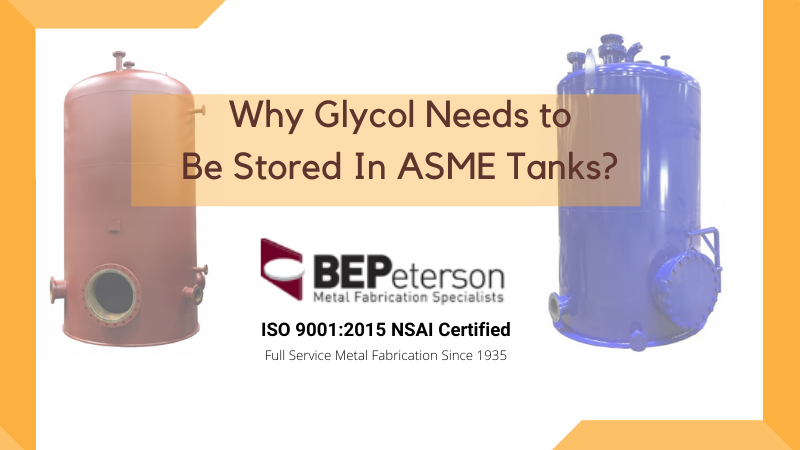Ethylene glycol is an organic compound, commonly known as glycol. This organic compound is used across multiple industries as a coolant, heat transfer agent, and antifreeze. This chemical is stored in special storage tanks are called glycol tanks, which are built to ASME specifications. This post analyzes why it is important to store glycol in ASME tanks and what are the typical features of these tanks.

Hazardous Properties of Glycol
Ethylene glycol is considered to be a moderately toxic material. However, its moderate toxicity can cause serious hazards to human health if it reacts with other chemical or environmental agents. Ethylene glycol and the byproducts of its chemical reactions can have an adverse impact on human health. The following pointers will help you understand it better.
- If ethylene glycol is inhaled or injected or accidentally consumed by a human, it can directly impact the central nervous system (CNS) of the personnel. If not stored in appropriate tanks, the chances of physical exposure and respiratory exposure to glycol increases, which can slowly lead to cognitive disorders.
- Frequent or high quantity exposure of ethylene glycol can lead to heart disorders or kidney failures.
- Glycol vapors or byproducts of glycol produced on the reaction with air, storage tank material, or other chemicals in the vicinity can lead to respiratory tract irritation.
- Direct contact with glycol vapors can cause eye irritation.
Due to certain hazards of glycol to the human body, it is essential to store it in high-quality glycol storage tanks. These industrial glycol storage tanks are manufactured in compliance with ASME standards and guidelines. The next introduces you to factors that govern the glycol storage tank manufacturing.
Important Factors Involved in ASME Glycol Storage Tank Manufacturing
ASME standards require manufacturers to adopt safe and effective design and manufacturing practices for glycol tank design, manufacturing, and testing. The following features will help you understand it better.
- Material Selection: Considering the toxicity of glycol, ASME glycol tanks are made using carbon steel or lined carbon steel. For low-intensity glycol storage, stainless steel of grades 304 and 316 are also suitable.
- Temperature Conditions: ASME standards guide manufacturers to adopt glycol storage capabilities under a temperature range of -20°F to 450°F.
- Pressure Conditions: The glycol storage tanks are usually designed for 125 to 250PSI pressure tolerance. Several ASME glycol tanks also feature glymatic assemblies for pressure applications.
- Surface Finish and Coating: ASME requires manufacturers to use red oxide for surface finishing. For the inner coating, the manufacturer can choose epoxy inner coating and cement-based inner coating.
- Surface Finish and Coating: ASME requires manufacturers to use red oxide for surface finishing. For the inner coating, the manufacturer can choose epoxy inner coating and cement-based inner coating.
- Welding Standards: For vessel construction, the manufacturers can opt for advanced welding procedures like TIG, SAW, SMAW, FCAW, etc. These procedures are described in detail across the following sections:
- ASME BPVC Section VIII: Standard rules for vessel construction under divisions 1 and 2.
- ASME BPVC Section IX: Welding and Brazing standards.
- ASME B16.25: Butt-welding regulations.
- Testing, Inspection, and Quality Control: Like any other ASME pressure vessels, the glycol storage tanks must pass the tests like a material test, hydro test, durability test, etc.
Owing to the above-mentioned factors, the ASME glycol tanks are proven safe and efficient for glycol storage.
In order to get optimum quality ASME glycol storage tanks, you must buy them from trusted ASME tank manufacturers like BEPeterson. The company provides customized ASME glycol storage tanks. They offer glycol tank custom manufacturing services with various options in tank head designs, sizes, shapes, and supplementary features like piping, etc. Their glycol tanks are compliant with ISO 9001, ASME, CRN, and PED, which certainly makes them one of the best glycol tank manufacturers in the USA.
